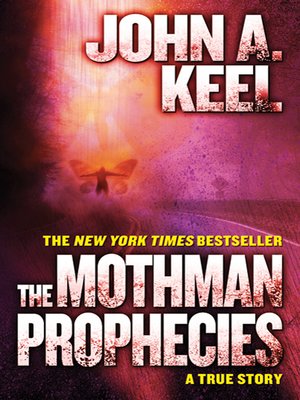

‣ john keel was quite racist and xenophobic (which is kind of ironic, for a ufologist). but i didn't even learn much about mothman!! there are a few accounts of mothman sightings, and the book ends with the tragic collapse of the silver bridge. but ufologist john keel mostly just gives accounts of people seeing lights in the sky and getting strange phone calls. ‣ it's not really about the mothman!! i love cryptids and was excited to read a cryptid classic from 1975. Some things to consider before deciding to pick up the mothman prophecies: That's my recommendation, and I do recommend reading it simply because it was so incredibly popular at one time and has a place in literature history. While Keel may have believed what he was writing, there were very people at the time who read this book as "fact." If you take it with a grain of salt and read it as "sci-fi" then it can be an enjoyable and somewhat terrifying read. He traveled to West Virginia to "study" a series of strange events this book was the result.

It turns out that we weren't that wrong - BUT, for Keel, that included everything the government told us about space exploration and life on other planets also was a lie. We trusted no one and everything that "officials" said was a lie. Remember that in the 70s, as again now, distrust of the government was rampant. He also absolutely believed every word that he wrote. John Keel was an avowed "UFOologist" - I'm not even sure that is spelled correctly, or a word, but that is what he claimed to be. It set me on a quest to read every horrifying book I could get my hands on and The Mothman Prophecies fell into that category. I read The Mothman Prophecies when it was first published - I know, scary, right? I was in high school and had just discovered Stephen King, a newish author that scared the hell out of me.

He did not call himself a ufologist and preferred the term Fortean, which encompasses a wide range of paranormal subjects. Keel coined the term "men in black" to describe the mysterious figures alleged to harass UFO witnesses and he also argued that there is a direct relationship between UFOs and psychic phenomena. It was Keel's second book, UFOs: Operation Trojan Horse (1970), that popularized the idea that many aspects of contemporary UFO reports, including humanoid encounters, often paralleled ancient folklore and religious encounters. Although his own thoughts about UFOs and associated anomalous phenomena gradually evolved since the mid 1960s, Keel remained one of ufology's most original and controversial researchers. Keel was arguably one of the most widely read and influential ufologists since the early 1970s. Keel wrote professionally from the age of 12, and was best known for his writings on unidentified flying objects, the "Mothman" of West Virginia, and other paranormal subjects. John Alva Keel (born Alva John Kiehle) was a Fortean author and professional journalist.


 0 kommentar(er)
0 kommentar(er)
